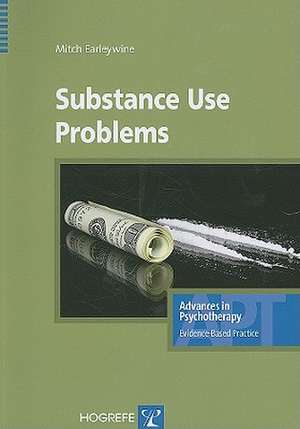Substance Use Problems: Advances in Psychotherapy; Evidence-Based Practice
Autor Mitchell Earleywineen Limba Engleză Paperback – 31 mai 2009
Preț: 207.31 lei
Nou
Puncte Express: 311
Preț estimativ în valută:
39.67€ • 41.43$ • 32.89£
39.67€ • 41.43$ • 32.89£
Carte indisponibilă temporar
Doresc să fiu notificat când acest titlu va fi disponibil:
Se trimite...
Preluare comenzi: 021 569.72.76
Specificații
ISBN-13: 9780889373297
ISBN-10: 0889373299
Pagini: 81
Dimensiuni: 175 x 249 x 8 mm
Greutate: 0.23 kg
Editura: Hogrefe & Huber Publishing
Seria Advances in Psychotherapy; Evidence-Based Practice
ISBN-10: 0889373299
Pagini: 81
Dimensiuni: 175 x 249 x 8 mm
Greutate: 0.23 kg
Editura: Hogrefe & Huber Publishing
Seria Advances in Psychotherapy; Evidence-Based Practice
Recenzii
"[...] a useful introduction to evidence-based practice in [the area of substance use problems]." Lt Col NK Cooper FRCSEd FFOM RAMC, Consultant Occupational Physician Bielefeld ROHT, Dr JP Hames MMedPsych, MRCPsych, Consultant Psychiatrist DCMHTidworth in the Journal of the Royal Army Medical Corps, Vol. 165, 2010 "Valuable contribution to the field of addiction medicine. [ - ] This volume is worthy reader-friendly book intended for therapists. It reads as an experiential distillation of practical knowledge from years of clinical and academic experience in problematic substance use, treatment, and research. The stated objective is '[to provide] trainees and professionals with a handy, concise guide for helping problem drug users - [and] improve [readers'] intuitions and clinical skills by adding an overarching understanding of drug use.' It is this writer's opinion that Dr. Earleywine has done so." Cher Yao Chen Chen, M. D. in Psychiatric Services, Vol. 61, No. 10, Oct 2010 "In this volume in the Advances in Psychotherapy series, the author provides an excellent primer for understanding substance use. In keeping with the series, this book seeks to increase clinicians' awareness and access to empirically supported interventions for substance use. Notably, the author provides an excellent examination of comorbid conditions and presents an unbiased biopsychosocial model. This is not only an excellent primer, but also an excellent refresher for seasoned clinicians. As with all of the books in this series, this one provides a strong background, complete with terminology and definitions. ...this solid addition to the field is recommended." Nicholas Greco IV, MS, BCETS, CATSM (College of Lake County) in Doody's Book Review "I really liked this book, but struggled with writing an endorsement that really captured my enthusiasm for what Mitch Earleywine has achieved. Every aspect of the book echoes the best in theory, research and practice that I have learned over my 30-year career in the addiction field. I could not recommend it more highly." George A. Parks, PhD, Associate Director, Addictive Behaviors Research Center, University of Washington, Seattle, WA "Dr. Earleywine has produced a wonderful introductory volume for practitioners and others who want to learn the current state of the art in empirically validated assessment and treatment of substance use disorders. In a refreshing departure from ideologically driven views of substance use and substance users, he has followed the science to produce a readable, informative volume." Frederick Rotgers, PsyD, ABPP, Program Director of Clinical Psychology PhD, Walden University, Minneapolis, MN "Mitch Earleywine's 'Substance Use Problems' is the ideal volume for teaching students the issues involved in contemporary treatment of substance abuse problems. This is unsurprising - since Dr. Earleywine has been teaching this subject for the last 17 years while regularly winning awards in the process - along with accolades from his students. The qualities that produce these reactions to his teaching are everywhere evident in this volume - clear writing and explanation, strong knowledge of the important research in the field, respect for readers, students, treatment clients, and counselors, and a cutting edge familiarity with modern therapy techniques (like motivational interviewing) and emerging trends in the treatment field (like harm reduction), along with respectful attention to established treatment approaches and groups like the twelve steps and AA. In the same pithy and hard-hitting volume, Dr. Earleywine manages both to convey empathic hints and subtly nuanced techniques to counselors in training, while describing diagnostic systems and epidemiological data on who is susceptible to substance abuse and how they are likely to fare -- with and without treatment. Mitch Earleywine's volume is a beacon of light, good judgment, and balance in this rapidly changing and contentious field." Stanton Peele, PhD; Author, 7 Tools to Beat Addiction; Creator, Life Process Program (www.stgregoryctr.com) "... this brief text will be most useful to those who have yet to acquire any experience in the field of addictionology such as students or, perhaps, even seasoned clinicians who had never taken a substance-abuse-related course [...] I found this volume to be very informative despite my 30 years of practice, and I learned a great deal from Earleywine's excellent discussion of motivational interviewing, information that I will undoubtedly be able to use with future patients." Gregory Mavrides in PsycCRITIQUES, 2010
Cuprins
1 Description of Problem Drug Use; 1.1 Terminology; 1.2 Definitions; 1.3 Epidemiology; 1.4 Course and Prognosis; 1.5 Differential Diagnosis; 1.6 Comorbidities; 1.7 Diagnostic Procedures and Documentation; 2 The Biopsychosocial Model of Drug Problems; 2.1 Interacting Components; 2.2 Initiation; 2.3 Regular Use; 2.4 Problem Use; 2.5 Treatment Outcomes; 3 Diagnosis, Assessment and Treatment Indications; 3.1 General Guidelines; 3.2 A Note on Taking Notes; 3.3 The Timeline Follow-Back (TLFB); 3.4 The Inventory of Drug Use Consequences (InDUC); 3.5 Motivation to Change; 3.6 Treatment History; 3.7 Social Support; 4 Methods of Treatment; 4.1 Overview; 4.2 Efficacy and Prognosis; 4.3 The Therapeutic Relationship as a Mechanism of Action; 4.4 Combinations of Methods; 4.5 Multicultural Issues; 5 Further Readings; 7 References; 8 Appendix.

